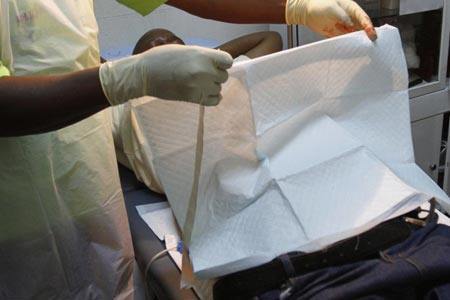
HEALTH experts have warned the government against introducing mandatory circumcision saying it infringes on people’s rights to choice as well as their cultural beliefs. BY CAIPHAS CHIMHETE
The Ministry of Health and Child Welfare last week announced its intention to introduce compulsory circumcision for infants in a bid to curb high levels of HIV infection.
A male circumcision coordinator in the Health ministry, Sinokuthemba Xaba last week said they had started a programme to train medical practitioners in preparation of the compulsory circumcision of babies.
He said the ministry was preparing medical practitioners for the procedure and was addressing problems they might face in conducting circumcision.
The ministry claims there is scientific evidence that proves circumcision reduces HIV infection rates by up to 60%.
But health experts argue that there have not been conclusive studies to prove that circumcision reduced infection by 60%, as alleged by the studies.
Community Working Group on Health (CWGH) executive director Itai Rusike dismissed mandatory circumcision saying it infringed on people’s rights.
“As civil society, we will not support such a proposal because it infringes on people’s rights,” said Rusike.
- Chamisa under fire over US$120K donation
- Mavhunga puts DeMbare into Chibuku quarterfinals
- Pension funds bet on Cabora Bassa oilfields
- Councils defy govt fire tender directive
Keep Reading
“Looking at the issue of rights, we must remember that people have a right to choose. If an infant is circumcised, he is denied the right to choose what is best for him.”
Rusike director said it was surprising that the ministry was pushing for mandatory circumcision when research had proved that it was not as effective as had been assumed.
Ronald L Poland, professor and chair of the department of paediatrics at the Pennsylvania State University College of Medicine in 1999 wrote that there were potential risks and benefits associated with circumcision.
“There are no conclusive medical studies documenting the health benefits of circumcision, although there are suggestive studies on both sides of the issue,” wrote Poland, in medical journal, Scientific American.
According to results of the study, published in the Thymos: Journal of Boyhood Studies in 2010, an estimated 100 baby boys die from circumcision complications each year in America, including from anaesthesia reaction, stroke, haemorrhage and infection.
The study found that about 117 neonatal circumcision-related deaths occur annually in America, one out of every 77 male neonatal deaths.
There are also reports of boys who “lost” their organs after undergoing the operation procedure.
Circumcision has also taken a toll on South Africa, where botched operations performed during traditional initiation rites killed 40 boys and more than 100 in hospital in one month in 2010.
Unconfirmed reports say circumcision deaths were also rampant in Zimbabwe, especially among the Shangani community in southern parts of the country.
Experts said if so many children were dying of circumcision-related operations in a developed country, thousands of children were vulnerable in Zimbabwe if mandatory circumcision was adopted in the country, which does not have enough expertise and drugs.
Rusike said it was culturally wrong for government to impose circumcision on tribes or religion that are against the concept.
Early this year, a court decision to outlaw circumcision on young boys because it caused bodily harm sparked fury among Jewish and Islamic groups in Germany. The court had made child circumcision a crime.
The Jewish religion considers circumcision of newborn boys as part of their culture.
Efforts to get a comment from the Health of Child Welfare minister Henry Madzorera were fruitless as he could not be reached for comment last week.
Circumcision of boys is most common among the Shangani tribe from the south of the country. However, it is not mandatory that every boy must be circumcised.
In other tribes, circumcised men are viewed as arrogant and stubborn — a perception that discouraged many boys from taking the circumcision challenge.
‘Ministry must not concentrate on trivia’ ITAI Rusike accused the Ministry of Health and Child Welfare of concentrating on trivia instead of crucial issues such as availability of drugs, ambulances and staffing levels in the health sector.
“They are diverting attention,” he said. ”The ministry must concentrate on real health issues.”
National Aids Council (NAC) chief executive officer Tapuwa Magure said while circumcision reduced the HIV infection rate, he was against the idea of mandatory circumcision.
“Most studies have shown that circumcision reduces the chances of infection but we don’t want things to be mandatory,” said Magure.
“It should not be legislated but people must be educated about the benefits of circumcisions so that they can make independent and informed choices. We say yes to circumcision but no to mandatory circumcision.”










